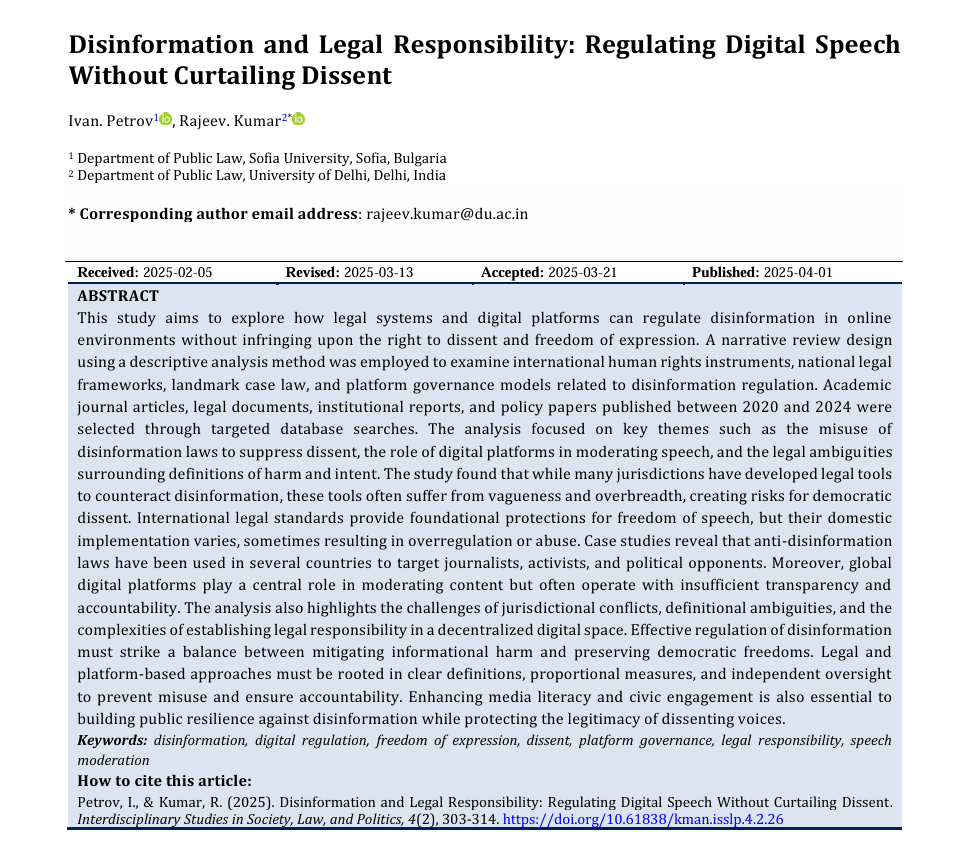Disinformation and Legal Responsibility: Regulating Digital Speech Without Curtailing Dissent
Keywords:
disinformation, digital regulation, freedom of expression, dissent, platform governance, legal responsibility, speech moderationAbstract
This study aims to explore how legal systems and digital platforms can regulate disinformation in online environments without infringing upon the right to dissent and freedom of expression. A narrative review design using a descriptive analysis method was employed to examine international human rights instruments, national legal frameworks, landmark case law, and platform governance models related to disinformation regulation. Academic journal articles, legal documents, institutional reports, and policy papers published between 2020 and 2024 were selected through targeted database searches. The analysis focused on key themes such as the misuse of disinformation laws to suppress dissent, the role of digital platforms in moderating speech, and the legal ambiguities surrounding definitions of harm and intent. The study found that while many jurisdictions have developed legal tools to counteract disinformation, these tools often suffer from vagueness and overbreadth, creating risks for democratic dissent. International legal standards provide foundational protections for freedom of speech, but their domestic implementation varies, sometimes resulting in overregulation or abuse. Case studies reveal that anti-disinformation laws have been used in several countries to target journalists, activists, and political opponents. Moreover, global digital platforms play a central role in moderating content but often operate with insufficient transparency and accountability. The analysis also highlights the challenges of jurisdictional conflicts, definitional ambiguities, and the complexities of establishing legal responsibility in a decentralized digital space. Effective regulation of disinformation must strike a balance between mitigating informational harm and preserving democratic freedoms. Legal and platform-based approaches must be rooted in clear definitions, proportional measures, and independent oversight to prevent misuse and ensure accountability. Enhancing media literacy and civic engagement is also essential to building public resilience against disinformation while protecting the legitimacy of dissenting voices.
Downloads
References
Azwar, A., Sarwoprasodjo, S., Soetarto, E., & Lubis, D. P. (2023). The Disinformation in Virtual Communities: A Systematic Literature Review. Technium Social Sciences Journal, 44, 656-672. https://doi.org/10.47577/tssj.v44i1.9011
Balcerzak, M., & Kapelańska-Pręgowska, J. (2024). International Human Rights Law in the Era of Digital Disinformation and Propaganda: Case Studies From Myanmar and Ukraine. Studia Prawnicze KUL(4), 7-26. https://doi.org/10.31743/sp.16760
Cornish, R. (2022). Unsilenced Employee Voice in South Africa: Social Media Misconduct Dismissals as Evidence of E-Voice. Management revue, 33(3), 356-396. https://doi.org/10.5771/0935-9915-2022-3-356
Domalewska, D. (2024). Dezinformacja Jako Zagrożenie Dla Demokracji I Regulacje Prawne W Zakresie Jej Przeciwdziałania W Polsce I Wybranych Krajach Europejskich. Politeja, 21(5(92)), 359-379. https://doi.org/10.12797/politeja.21.2024.92.16
Hendricks, V. F., & Mehlsen, C. (2022). The Ministry of Truth. https://doi.org/10.1007/978-3-030-98629-2
Kenes, B., & Yılmaz, İ. (2024). Digital Authoritarianism and Religious Populism in Turkey. https://doi.org/10.55271/pp0042
Ladia, C. E. P. (2023). #MassTestingNowPH Tweets as Acts of Citizenship: The Rhetorical Functions of Tweets in Pandemic-Stricken Philippines. Plaridel. https://doi.org/10.52518/2023-09ceplad
Maroń, G. (2022). Fact-Checking a Wolność Słowa. Radca Prawny(1 (30)), 84-105. https://doi.org/10.4467/23921943rp.22.007.15809
Marushchak, A. (2022). Prerequisites for the Legal Mechanisms Development to Combat Disinformation in Social Media in the Context of National Security: Problem Statement. Information and Law(1(40)), 82-88. https://doi.org/10.37750/2616-6798.2022.1(40).254345
Marushchak, A., & Petrov, S. (2024). EU and US Legal Mechanisms to Block Russian Disinformation in Social Networks. Information and Law(4(51)), 66-72. https://doi.org/10.37750/2616-6798.2024.4(51).317797
McDowell, K. B. (2023). American Prison Newspapers, 1800‐2020: Voices From the Inside. The Charleston Advisor, 24(3), 10-13. https://doi.org/10.5260/chara.24.3.10
Miller, S., & Bossomaier, T. (2024). Freedom of Political Communication and Computational Propaganda. 96-149. https://doi.org/10.1093/oso/9780190058135.003.0004
Nossel, S. (2024). The Fate of American Democracy Depends on Free Speech. Daedalus, 153(3), 119-134. https://doi.org/10.1162/daed_a_02093
Peters, C., & Allan, S. (2021). Weaponizing Memes: The Journalistic Mediation of Visual Politicization. Digital journalism, 10(2), 217-229. https://doi.org/10.1080/21670811.2021.1903958
Putri, M. (2021). The Effects of Disinformation and Propaganda Towards Freedom of Press and Freedom of Speech. https://doi.org/10.13140/rg.2.2.24968.34569
Rashid, J., Asghar, M. S., Qamar, M. S., & Tabassum, M. B. (2024). Freedom of Speech and Expression in Pakistan. Al-Qamar, 175-194. https://doi.org/10.53762/alqamar.07.01.e10
Shams, A. T. (2024). Dissent Under Siege: Case Studies of Repression in the Digital Era of Bangladesh. Advances in Journalism and Communication, 12(01), 207-230. https://doi.org/10.4236/ajc.2024.121011
Składanek, B. (2023). The Accusation of Disinformation as a Pretext to Limit the Freedom of Speech at the Time of the Covid-19 Pandemic. Przegląd Prawa Konstytucyjnego, 71(1), 283-293. https://doi.org/10.15804/ppk.2023.01.21
Starbird, K. (2022). Strategy and Structure. 213-230. https://doi.org/10.1093/oso/9780197621080.003.0013
Terry, P. E. (2024). Misinformation, Free Speech and Accountability in Health Communications. American Journal of Health Promotion, 39(1), 13-14. https://doi.org/10.1177/08901171241288972
Török, B. (2024). Free Speech Principles to Consider When Restricting Disinformation. Információs Társadalom, 24(2), 115. https://doi.org/10.22503/inftars.xxiv.2024.2.7
Tosi, C. (2021). Linguistic Traces of Subjectivity and Dissent. A Discursive Analysis of Inclusive Language in Argentina. Frontiers in Sociology, 6. https://doi.org/10.3389/fsoc.2021.633330
Xu, N., Chen, L., Yu, Z., & Zhu, X. (2022). An Epistemic Trend or a Digital Pitfall? De‑Westernizing Media and Communication Studies in Digital China. Galactica Media Journal of Media Studies, 4(4), 30-46. https://doi.org/10.46539/gmd.v4i4.288
Zick, T. (2021). Parades, Picketing, and Demonstrations. 369-388. https://doi.org/10.1093/oxfordhb/9780198827580.013.21

Downloads
Additional Files
Published
Submitted
Revised
Accepted
Issue
Section
License

This work is licensed under a Creative Commons Attribution-NonCommercial 4.0 International License.





